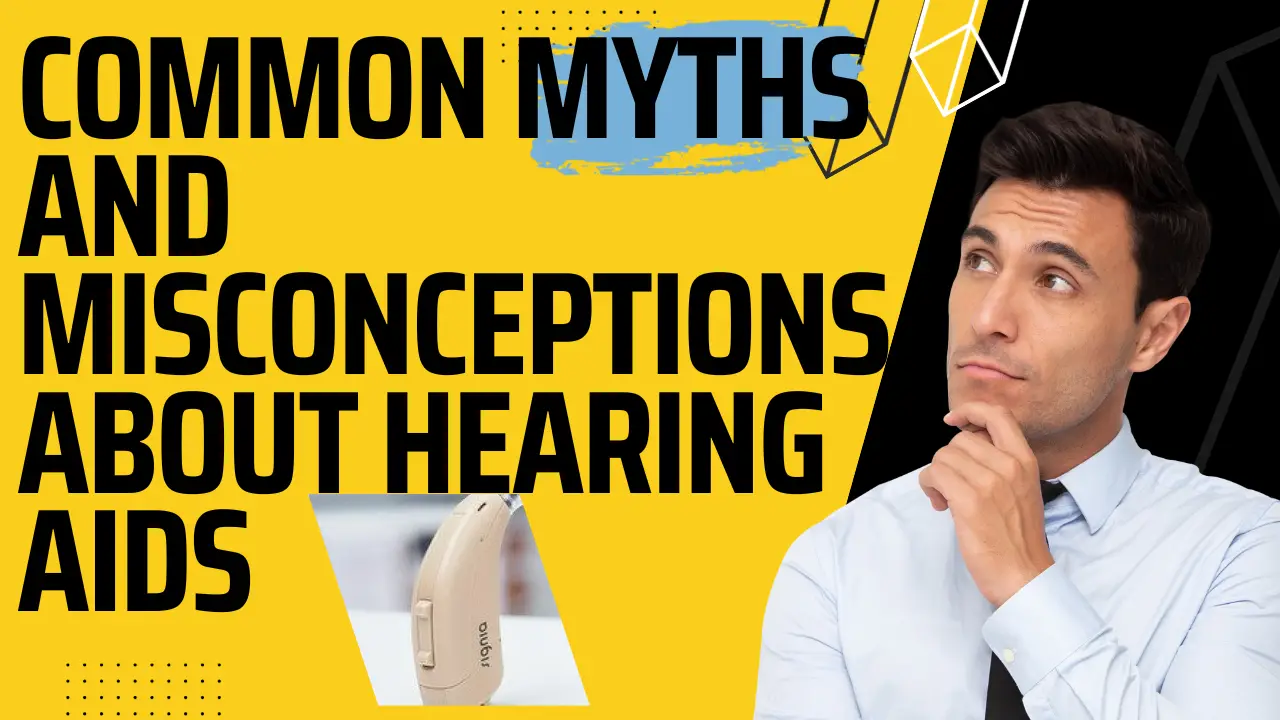Explore the truth behind “Common Myths and Misconceptions About Hearing Aids” in our human-written guide. Debunk age stereotypes and delve into the comfort and customization realities, empowering informed decisions for an enriched auditory experience. Uncover insights on pricing, insurance, and the synergy of lip reading. Your path to understanding hearing aids awaits – clear, concise, and genuinely human.
Introduction: Common Myths and Misconceptions About Hearing Aids
Let’s dive into the world of hearing health and unravel the true story behind hearing aids. In this journey, we’re here to clear up the common myths about these devices, so you can make decisions about your hearing that feel right to you.
Myth: Only Grandma and Grandpa Wear Hearing Aids

Let’s kick things off by breaking the stereotype that hearing aids are only for the elderly. Hearing loss doesn’t matter how old you are; it can happen to anyone. So, whether you’re a music buff or it runs in the family, hearing aids are there for everyone—time to ditch the idea that these little wonders are just for the grandparents.
Myth: Hearing Aids Are Big and Uncomfortable
Say goodbye to the old notion that hearing aids are clunky and uncomfortable. Today’s models are sleek, discreet, and surprisingly comfy. Thanks to some tech magic, they’ve become like the cool sidekick you didn’t know you needed. With different styles, you can find one that fits your vibe. Forget about being uncomfortable and bulky – the latest designs are all about being discreet and feeling good.
Myth: One Size Fits All
Let go of the idea that hearing aids are a one-size-fits-all deal. Your hearing is as unique as you are, and your hearing aids should reflect that. Audiologists are like personal tailors for your ears, customizing hearing aids just for you. It’s like getting a custom outfit for your ears – made to fit your hearing needs perfectly.
Myth: Hearing Aids Bring Back Perfect Hearing
While hearing aids are amazing, they’re not magic wands that bring back perfect hearing. They amplify sounds, making things audible, but they won’t turn back time on your hearing. Setting realistic expectations and getting guidance from your audiologist is the key to a positive experience with hearing aids.
Myth: Hearing Aids Are Only for Serious Hearing Loss
If you think hearing aids are only for folks with serious hearing loss, it’s time for a reality check. These gadgets work for all levels of hearing impairment, from a bit of trouble hearing to the more serious stuff. Getting the right hearing aids early on can make a real difference, keeping your hearing in check and making life better.
Myth: Hearing Aids Break the Bank, and Insurance Won’t Help
Let’s debunk the myth that hearing aids are crazy expensive. While some might cost a bit more, there are options for every budget. And here’s some good news – many insurance plans cover hearing aids now. Taking care of your hearing health might not put as much strain on your wallet as you thought.
Myth: Hearing Aids Might Mess with Your Ears
Worried that using hearing aids might cause trouble for your ears? Fear not. Modern hearing aids are designed with care, amplifying sounds without causing any harm. Audiologists fine-tune these gadgets to make sure they enhance your hearing without any downside. When used right and with professional guidance, hearing aids won’t mess with your ear health.
Myth: Lip Reading Is Better Than Hearing Aids
While being good at lip reading is cool, it’s not a replacement for the rich experience that hearing aids provide. These little marvels bring a symphony of sounds to your ears, making communication a whole lot better. Combining lip reading with hearing aids? That’s a winning combo for understanding spoken language in all sorts of situations.
| Myths and Misconceptions About Hearing Aids | The Real Deal |
|---|---|
| 1. Only for the Elderly | Hearing aids are not age-specific. Hearing loss can affect individuals of all ages due to various factors. |
| 2. Bulky and Uncomfortable | Modern hearing aids are sleek, discreet, and comfortable, thanks to technological advancements. Various styles cater to individual preferences. |
| 3. One Size Fits All | Hearing aids are customized to address the unique needs of each individual. Audiologists tailor solutions based on the type and degree of hearing loss. |
| 4. Restores Perfect Hearing | While hearing aids significantly improve auditory experiences, they do not fully restore hearing to its original state. Realistic expectations are crucial for satisfaction. |
| 5. Only for Severe Hearing Loss | Hearing aids are beneficial for varying degrees of hearing loss, from mild to moderate to severe. Early intervention can prevent further deterioration. |
| 6. Expensive and Not Covered by Insurance | Hearing aids come in a range of prices, and many insurance plans now recognize their importance, providing coverage for these devices. |
| 7. May Cause Further Damage | Modern hearing aids are designed to amplify sounds without causing harm. When used correctly and under professional guidance, they pose no risk to ear health. |
| 8. Lip Reading Suffices | While lip reading is valuable, it cannot replace the comprehensive auditory experience provided by hearing aids. Combining both enhances communication effectively. |
Conclusion
Clearing up the myths about hearing aids is like opening a window and letting in the fresh air – suddenly, everything becomes clearer. Understanding the real deal empowers you to make choices that feel right for your hearing health. Embrace the tech, get advice from the pros, and say goodbye to those old hearing aid myths. Your ears will thank you, and you’ll step into a world of better hearing – a vibrant and truly yours.
Frequently Asked Questions (FAQs) – Demystifying Hearing Aids
- Who can benefit from hearing aids?
- Hearing aids are not age-specific; they can benefit individuals of all ages experiencing hearing loss due to various factors, including exposure to loud noise, genetic predisposition, or certain medical conditions.
- Are modern hearing aids still bulky and uncomfortable?
- No, modern hearing aids have undergone significant advancements, making them sleek, discreet, and comfortable. Various styles cater to individual preferences, ensuring a more user-friendly experience.
- Do hearing aids follow a one-size-fits-all approach?
- No, hearing aids are customized to address the unique needs of each individual. Audiologists conduct thorough assessments to determine the type and degree of hearing loss, tailoring solutions accordingly.
- Can hearing aids fully restore perfect hearing?
- While hearing aids significantly improve auditory experiences, they do not fully restore hearing to its original state. Realistic expectations are crucial for satisfaction with the benefits they provide.
- Are hearing aids only beneficial for severe hearing loss?
- No, hearing aids are valuable for varying degrees of hearing impairment, from mild to moderate to severe. Early intervention with the right hearing aids can prevent further deterioration and enhance overall quality of life.
- Are hearing aids expensive, and are they covered by insurance?
- Hearing aids come in a range of prices, and many insurance plans now recognize their importance, providing coverage for these devices. There are options to fit different budgets.
- Do hearing aids pose a risk to ear health?
- Modern hearing aids are designed with advanced technology to amplify sounds without causing harm. When used as directed and under professional guidance, hearing aids pose no risk to ear health.
- Can lip reading replace the need for hearing aids?
- While lip reading is a valuable skill, it cannot replace the comprehensive auditory experience provided by hearing aids. Combining lip reading with the use of hearing aids enhances overall communication effectively.
Read More On hearing aids:



2 thoughts on “Common Myths and Misconceptions About Hearing Aids”